A Dance in Russia
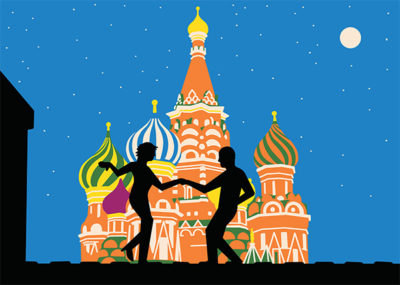
Illustration: Sam Island
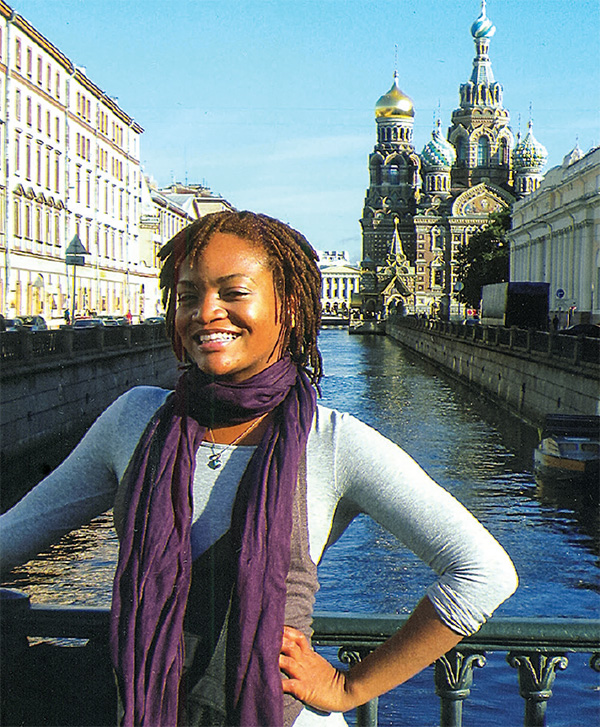
LaShonda Cooks ’10
I couldn’t wait to try borscht. I ordered the beetroot soup on my first night in St. Petersburg, when our group went out for dinner. Mid-meal, an older Russian gentleman came up to our table and asked me to dance. Everybody egged him on. “Go! Dance!” they told me. I blushed the whole time we two-stepped. St. Petersburg was a fairy tale. It had luxurious palaces, beautiful churches topped with gilded copper, and brilliant-colored tiles.
Vasilyevsky Island, where we slept, is connected to the rest of St. Petersburg by drawbridges that go up daily around 2 a.m. and don’t drop back down for crossing until around 5 a.m. One night after hitting a club, where we danced in a mock hip-hop battle with locals, we raced against the clock, our taxis scurrying across the bridge just in the nick of time.
None of my group spoke the language well, so when we first arrived we pantomimed a lot and asked “What’s this?” in Russian while pointing at menus. Luckily, our hosts accommodated us. By the end of our month’s stay, I had mastered the essentials, learning to say “chicken,” “how much,” and “tea with milk, please.” To this day, my ears still perk up when they hear a little Russian. Or Mandarin. I was traveling as part of Babson’s BRIC program, which takes students to some of the world’s fastest-growing economies. Our group also studied in China. In Beijing, I fell in love with Sichuan lamb. It was so spicy, drops of sweat snaked down my forehead. But my favorite moment was climbing the Great Wall. It was surprisingly tough: tiny steps in some areas, huge bricks in others. At the end, we zip-lined across a small lake to a nearby village. I am eternally grateful for the BRIC experience. I learned to face the unknown with grit, patience, and a smile, a lesson I still use daily.—LaShonda Cooks ’10
Ghana Inspires a Startup
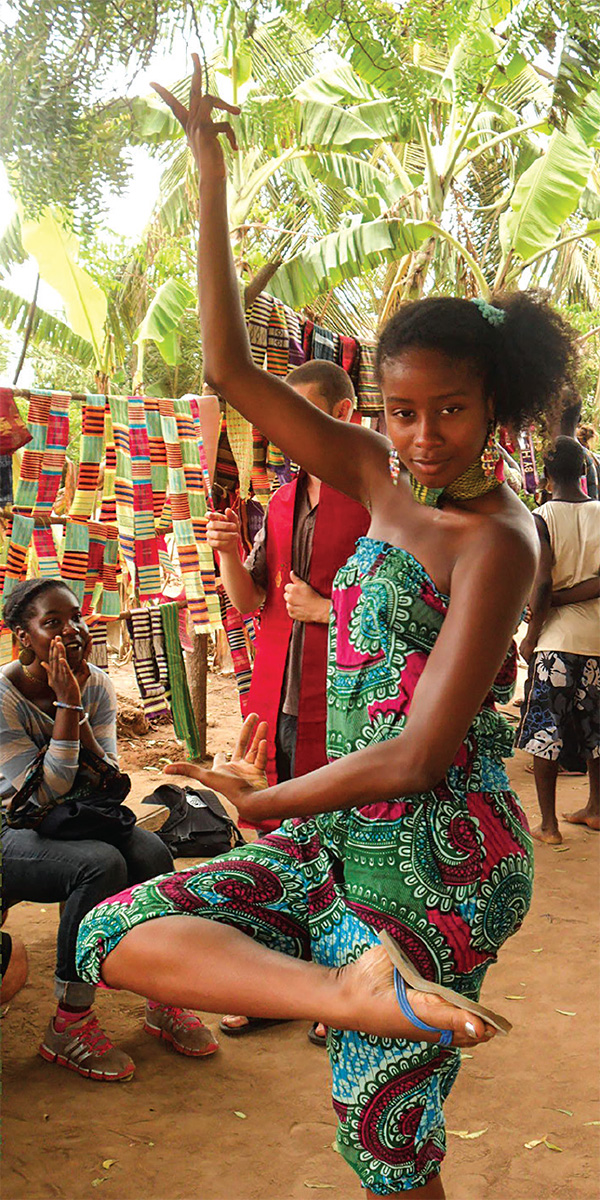
Renee Edwards ’13
It’s 6:30 a.m. on my first day in Accra, Ghana. I unzip my mosquito tent, swing my legs off the bed, and walk to the bedroom door. As I step into the hallway, my homestay brother, Kwesi, greets me and asks if I want koko (corn porridge) and fresh fruits for breakfast. I do. The chickens from his urban farm cluck and shuffle in the backyard, and his rooster crows at random.
Kwesi hands me a five-gallon bucket half-filled with water, and I head to the bathroom to take a quick, cold bucket bath, holding my breath before dumping the remaining water over my body. I get dressed and head to the dining room. Kwesi and I talk casually through breakfast. He teaches me a few words in the Ghanaian languages of Fante, Twi, Ewe, and Ga.
For dinner, he tells me that he’s going to make a vegan version of jollof rice, a traditional Ghanaian dish, to accommodate my diet. Kwesi’s jollof would become my favorite meal in Ghana, and this table would become home to late nights and countless hours of conversation about life, love, our hopes, and our dreams.
This story describes a fraction of the gifts that Ghana gave me. After four months of studying and traveling with 18 students around the country, no one memory stands out above the rest. There were moments of connection, like talking with Kwesi for hours, or listening to my Kumasi homestay mother recite folk stories in Twi. There were moments of celebration, like dancing and singing in every village and town we visited. And there were moments of creativity, like making batik prints in Accra, weaving kete cloth in the Volta region, and making beads from scratch in the Ashanti region.
What stands out is a feeling of complete peace and connection—to the people, the food, and the environment. Years later, my experiences in Ghana inspired me to start my business, Never Underestimate Simple, a beauty and wellness company focusing on the power of nature and simplicity to help people look and feel happy, healthy, and beautiful. Ghana lives through our message of helping people slow down and connect—to themselves, their bodies, their environment, and each other.—Renee Edwards ’13
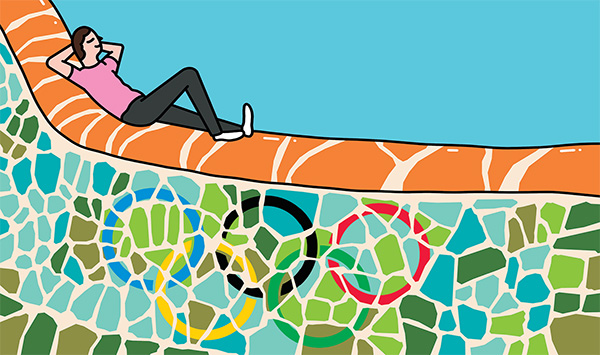
Illustration: Sam Island
An Olympic Summer in Spain
I had realized that I did not want to be an accountant. At the time, international business was a new major at Babson and seemed like a great fit for me. As part of the curriculum, I needed to take another language, so I decided to study Spanish abroad in Barcelona in the summer of 1992. Roy Avellaneda ’93 joined me.
We stayed with a family who wanted their sons to have exposure to Americans. The family spoke fluent English, but we encouraged them to speak in Spanish, which forced us to learn. One of their homes was in Costa Brava, where the family would go and bring us on the weekends. I would compare Costa Brava to Cape Cod in Massachusetts. Their sons introduced us to their friends, who welcomed us with open arms. They took us to the beach, where we went cliff jumping and windsurfing, and to the “discoteca.” One Sunday, we had a wonderful fiesta with the entire family. Paella was served, and it was delicious.
One of my more memorable experiences was a night at Las Ramblas, one of the main areas of Barcelona. The city was buzzing. The Olympics were held in Barcelona that summer, and the Dream Team had just won the gold medal for basketball. Roy and I noticed a large fancy bus coming down the street. We decided to follow. There was police activity around the bus, and we had a feeling it contained important people. Magic Johnson got off, then Chris Mullin, Charles Barkley, and Larry Bird. The entire team was on the bus. We screamed “USA” and let Larry know we were from Boston. The players were friendly and seemed appreciative.
Seeing Olympic events was memorable, but learning another language and culture was invaluable. Since graduating from Babson, I have worked as a financial adviser. It feels good to be able to communicate with my clients who speak Spanish. But Spain not only helped me learn another language, it also helped me view the world more broadly. Learning about different cultures and the way that they do business is important in our global society.—Adam Sachs ’93
From the Dominican to India
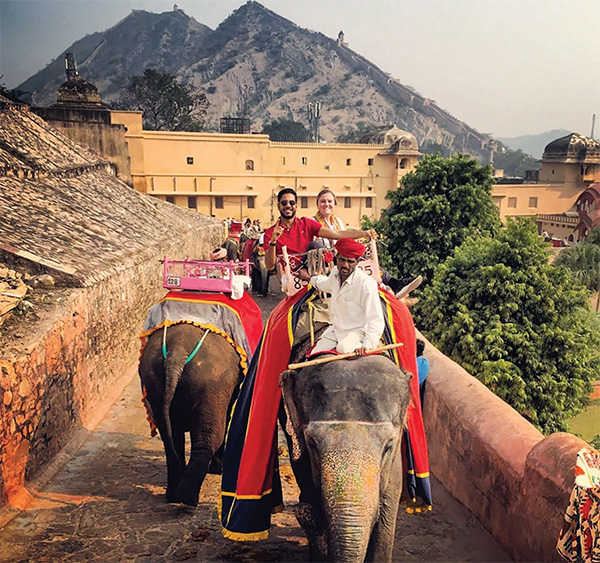
Josuel Plasencia ’17 (riding, left)
In this warm culture, the expectation is a smile, the food is rich in flavor, and a dance always accompanies the music. Where is this? In my homeland of the Dominican Republic. In my country, hospitality trumps everything, love is an ingredient in the dish called mofongo, and nights become dawn through the dance steps of merengue and bachata. Growing up, I never thought I would find another place like home, but that changed when I studied abroad with the BRIC program. In India, our third and final stop (after Russia and China), I was hit with all the feelings of home. Mofongo became biriyani, merengue went Bollywood, and the smiles multiplied, since India’s population is 125 times larger than that of the Dominican Republic.
I also felt uplifted when we took a group trip to Bal Ashram, a recovery center and new home for children who were victims of child labor. Trauma occurs when you don’t know your given name, your birthdate, or who your parents are, but Bal Ashram is the beginning of a new life. To see the positive energy of the children, who smiled like the world is theirs despite their history, was inspiring.—Josuel Plasencia ’17
Feeling at Home in India
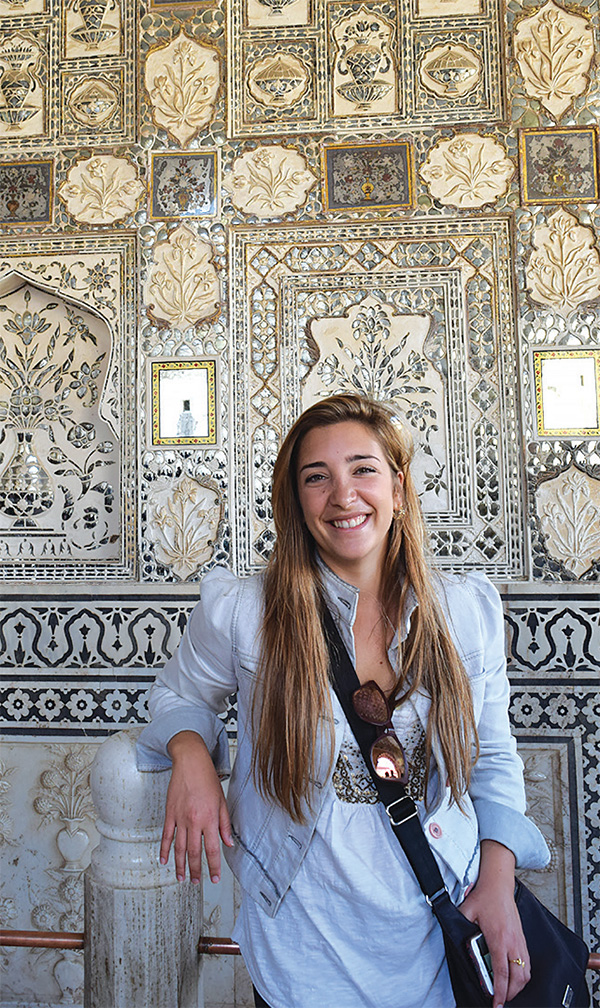
Marielle De Blois, MBA’16
I knew I would be interacting with people from many different cultures at Babson, but I never imagined traveling across India for more than two weeks with 30 of my classmates. This trip came about because I was dating Shishir Patil, MBA’16. He’s from India, and since I am from Venezuela, I was intrigued by his culture and how different it was from mine. I wanted to visit India to truly experience it. Shishir planned the entire trip for what we imagined would be a small group, just me and two friends. But then we decided to post it on our class Facebook page so that people could sign up, and many did.
We went during the January break, starting in Delhi, which is in the North, and traveling south to Bangalore. We visited large cities such as Mumbai, as well as traditional villages such as Jaisalmer in the desert and Alleppey along the sea. We visited a couple of family-owned factories that make clothing. They were small and everything was made by hand. Each of them probably had just a couple of workers, and they allowed us to do some prints ourselves.
The food in India was amazing, the colors were spectacular, and the scenery was majestic. But what impacted me the most during this trip were the welcoming and warm Indian people. So many Babson students from India went out of their way to make us feel at home. When a classmate and I arrived in Delhi at 4 a.m., Siddharth Astir, MBA’16, picked us up at the airport and took us back to his house, where he and his family had prepared a feast to welcome us. The following day Rishiraj Kessar and Danish Kakar, both MBA’16, arranged a party at the farmhouse belonging to Rishiraj’s family. They had caterers, music, and drinks for us to enjoy. Other classmates also invited us to their homes when we stopped by their cities.
Our hosts truly overwhelmed us with their kindness. They inspired me to be more like them, not only to welcome guests to my country, but also to show this kind of generosity to others in my day-to-day life.—Marielle De Blois, MBA’16
Seeing Business Boom in Ireland

Illustration: Sam Island
Two things stand out about my study-abroad experience in Ireland. First, I loved having the chance to get to know a few of my classmates better. These kinds of trips bring you together differently than the group work on campus. I still think about a number of happy memories, such as touring the Baileys factory with everyone. We each received a bottle of Baileys as a souvenir, which we proceeded to enjoy with our coffee for the remainder of the trip.
Second was the ability to witness so much of what I had learned in the classroom in action at major corporations and in the country. The Celtic Tiger was roaring when my MBA group visited in March 1999, and we had the chance to visit EMC, Dell, and other companies that were booming. Jobs were plentiful and well-paid, and housing was exploding.
This was a complete reversal of fortune for Ireland, which had battled a young labor exodus for decades. I actually had been to Ireland in the early ’80s, when it was a monumentally depressing place and the young people were exiting as fast as they could. I was only a teenager, but I could see that the future looked bleak for people just a few years older than me. To return almost 20 years later and see the place thriving, that the Americans and English were eager to be working there, and that the young Irish had fabulous jobs, was incredible.
This trip was the first time I had traveled and seen businesses in action. My travel always had been for tourism or as an exchange student, so this trip offered a whole new way of looking at a country and its people.—Rachel Connell, MBA’99
Learning in Japan in the 1980s
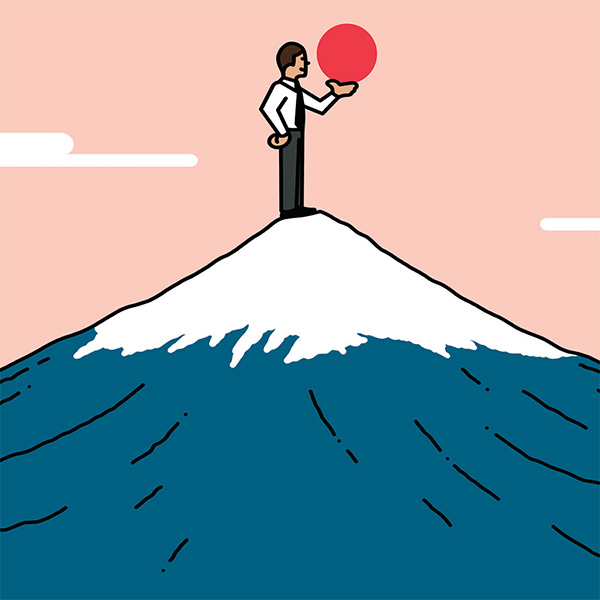
Illustration: Sam Island
The summer between my sophomore and junior years, professor David Hennessey took a few of us to Japan for the class “Japanese Business Management.” We learned the buzzwords and management terms for which the Japanese were famous. Remember that back in the ’80s, Japan was seemingly buying everything it could in America, just as China appears to be doing today. It was the place to go if you were interested in business.
The trip was a mix of lectures and cultural experiences. I was fascinated to be in a country where English wasn’t the primary language, giving gifts to your host was an important practice, and doing a slight bow to a senior manager was customary. (I had never done it before. I always thought that was reserved for royalty.) Manufacturing was huge, and we toured Murata Machinery. (Anyone remember those fax machines?) We also toured Toyota and Yamaha. We learned some Japanese, and while traveling on bullet trains, some local businessmen taught us a few drinking games.
We learned about the Japanese educational system, and about the pressure to succeed and the high expectations that families often had for their children. The kids in the school that we were associated with had a sense of urgency and seemed to be driven to succeed. And in terms of business, we noticed that there were very clear lines for the pecking order of who was the boss. Looking from the outside, you could tell in meetings, classroom sessions, and company visits that there was one way to do things, and no one seemed to question it.
All in all, it was a great trip and a wonderful time to be in school.—Willie Nelson ’88
Interning in China
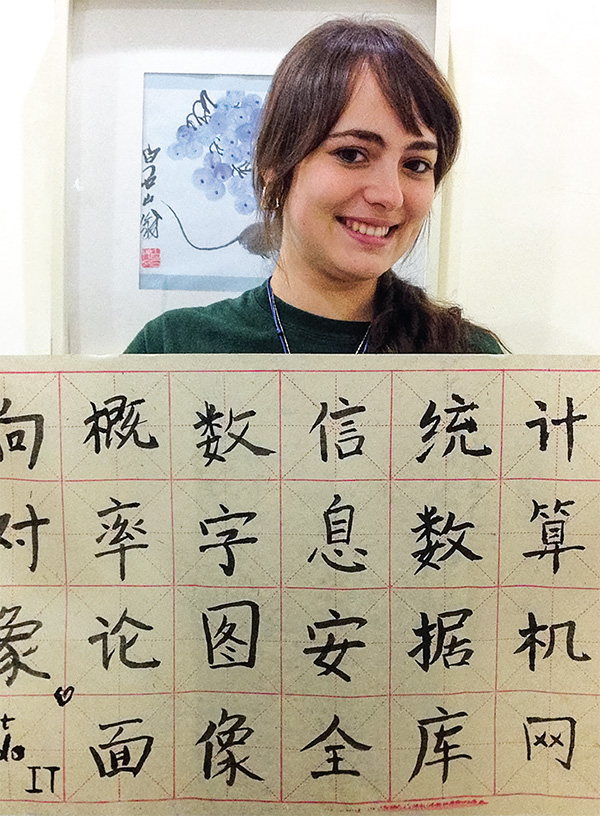
Roxelane Wagner ’16
I studied abroad in Shanghai, China. It’s an amazing city—huge and busy. The streets are crazy. I had an app that helped me find my way around the subway system.
I took various classes, and every morning I had two hours of Chinese language. I also had a Chinese roommate, which I liked a lot because I could communicate with her in Mandarin. She would tell me about her life and where she was from, and she would help me with my homework.
I had two internships, and they were extremely different. For one, I was an English instructor for a leading manufacturer of foam plastics in Asia. For the other, I was a business development manager assistant for a beer distribution company. For that internship, I was asked to help out at various company events and was able to work directly with Chinese consumers. I found that to be especially interesting, because it wasn’t theory. It was practical and different from just hearing about consumers.
I had a great experience abroad. If you have the opportunity to be outside your comfort zone, I recommend that you do it. You won’t feel as uncomfortable with people who are different from you in the future.—Roxelane Wagner ’16
